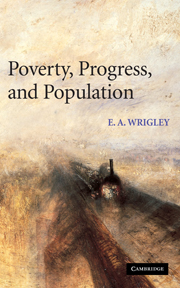Book contents
- Frontmatter
- Contents
- List of figures
- List of tables
- Acknowledgements
- Introduction
- PART I The wellsprings of growth
- PART II Town and country
- 9 City and country in the past: a sharp divide or a continuum?
- 10 ‘The great commerce of every civilized society’: urban growth in early modern Europe
- 11 Country and town: the primary, secondary, and tertiary peopling of England in the early modern period
- PART III The numbers game
- Bibliography
- Index
11 - Country and town: the primary, secondary, and tertiary peopling of England in the early modern period
Published online by Cambridge University Press: 23 December 2009
- Frontmatter
- Contents
- List of figures
- List of tables
- Acknowledgements
- Introduction
- PART I The wellsprings of growth
- PART II Town and country
- 9 City and country in the past: a sharp divide or a continuum?
- 10 ‘The great commerce of every civilized society’: urban growth in early modern Europe
- 11 Country and town: the primary, secondary, and tertiary peopling of England in the early modern period
- PART III The numbers game
- Bibliography
- Index
Summary
There are many ways of depicting the constitution of a given society and of defining and measuring the changes taking place within it. They will reflect the interests and purposes of the scholars concerned, tempered by the source materials available to them. This essay reflects the conviction that the occupational structure of a society and the changes therein offer the opportunity to gain an insight into much else about that society and its development. The way in which men and women earned a living reveals much about them and their communities. Though true of all societies, this was perhaps especially true of societies before the industrial revolution.
It is instructive to consider why this should be so. At bottom it follows from the fact that occupational structure in pre-industrial societies reflected the hierarchical nature of human needs, which produced some notable and readily observable regularities. The thinking and terminology of the classical economists reflected their appreciation of this point. They frequently referred to what they termed the necessities of life, of which there were four: food, shelter, clothing, and fuel. These they distinguished both from what they characterised as comforts or conveniences, other material products which were less central to life than the necessities but eagerly sought after when circumstances permitted; and from luxuries, goods, or services to which only the affluent could aspire. If circumstances are sufficiently bleak people will favour spending on necessities above all other forms of expenditure, so that a very high proportion of the total spending of the poor will be devoted solely to necessities and above all to food.
- Type
- Chapter
- Information
- Poverty, Progress, and Population , pp. 290 - 314Publisher: Cambridge University PressPrint publication year: 2004



